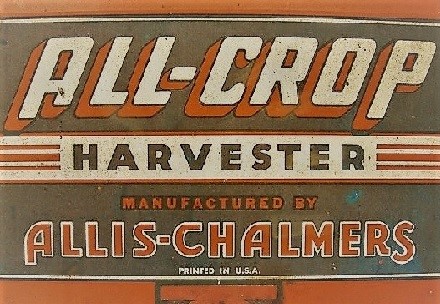| Author |
 Topic Search Topic Search  Topic Options Topic Options
|
CrestonM 
Orange Level


Joined: 08 Sep 2014
Location: Oklahoma
Points: 8455
|
 Post Options Post Options
 Thanks(0) Thanks(0)
 Quote Quote  Reply Reply
 Topic: Tractor died, won't start. Topic: Tractor died, won't start.
Posted: 23 Nov 2015 at 6:09pm |
Had my 8N running earlier and it wasn't charging. I wanted to make sure my amp gauge was good so I grounded out the field terminal at the VR by touching the field terminal with a wire and touching the other end to the battery. The needle jumped over and the tractor died. Now it won't start. No spark. What happened?!?!?! Any ideas? Thanks
|
 |
|
Sponsored Links
|
|
 |
jaybmiller 
Orange Level Access

Joined: 12 Sep 2009
Location: Greensville,Ont
Points: 24703
|
 Post Options Post Options
 Thanks(0) Thanks(0)
 Quote Quote  Reply Reply
 Posted: 23 Nov 2015 at 6:24pm Posted: 23 Nov 2015 at 6:24pm |
|
No spark could mean
1) blown fuse
2) burned out wire
3) burned out coil
4) welded points
5) blown ballast resistor
6) busted ignition switch
Get a good schematic of the 8N and a voltmeter, follow the +12 from battery to the coil.
Sooner or later you'll not have 12 volts,whatever's in front of that is kaput.
Jay
|
|
3 D-14s,A-C forklift, B-112
Kubota BX23S lil' TOOT( The Other Orange Tractor)
Never burn your bridges, unless you can walk on water
|
 |
banjerpicker 
Silver Level


Joined: 26 Apr 2015
Location: Tennessee
Points: 188
|
 Post Options Post Options
 Thanks(0) Thanks(0)
 Quote Quote  Reply Reply
 Posted: 23 Nov 2015 at 6:24pm Posted: 23 Nov 2015 at 6:24pm |
|
I wonder if you shorted out the coil. Not sure about the not charging part.
|
 |
DougS 
Orange Level


Joined: 03 Nov 2011
Location: Iowa
Points: 2490
|
 Post Options Post Options
 Thanks(0) Thanks(0)
 Quote Quote  Reply Reply
 Posted: 23 Nov 2015 at 6:25pm Posted: 23 Nov 2015 at 6:25pm |
|
You don't ground out a field terminal by touching it to the battery, you touch it to ground. I suspect that you blew a fuse somewhere. Not that I have any idea of how an 8N is wired.
|
 |
CrestonM 
Orange Level


Joined: 08 Sep 2014
Location: Oklahoma
Points: 8455
|
 Post Options Post Options
 Thanks(0) Thanks(0)
 Quote Quote  Reply Reply
 Posted: 23 Nov 2015 at 8:26pm Posted: 23 Nov 2015 at 8:26pm |
 DougS wrote: DougS wrote:
You don't ground out a field terminal by touching it to the battery, you touch it to ground. I suspect that you blew a fuse somewhere. Not that I have any idea of how an 8N is wired.
|
I thought as long as you touched it to a ground it would work. I touched it to the + (ground) terminal.
There aren't any fuses to blow, except the headlight fuse.
|
 |
DougS 
Orange Level


Joined: 03 Nov 2011
Location: Iowa
Points: 2490
|
 Post Options Post Options
 Thanks(0) Thanks(0)
 Quote Quote  Reply Reply
 Posted: 23 Nov 2015 at 8:45pm Posted: 23 Nov 2015 at 8:45pm |
|
You may have blown your ammeter. Short the two studs together and see if it will start.
|
 |
CrestonM 
Orange Level


Joined: 08 Sep 2014
Location: Oklahoma
Points: 8455
|
 Post Options Post Options
 Thanks(0) Thanks(0)
 Quote Quote  Reply Reply
 Posted: 23 Nov 2015 at 9:25pm Posted: 23 Nov 2015 at 9:25pm |
|
Ammeter still shows headlight discharge. Besides, it's an induction ammeter. No studs. Wire just passes by.
|
 |
Dmpaul89 
Orange Level


Joined: 06 Mar 2013
Location: Edwardsville,IL
Points: 1689
|
 Post Options Post Options
 Thanks(0) Thanks(0)
 Quote Quote  Reply Reply
 Posted: 23 Nov 2015 at 9:39pm Posted: 23 Nov 2015 at 9:39pm |
|
At least your distributor is on the side like a normal tractor. 9ns like mine are behind the radiator. A real pita. Hood and rad have to be removed. Shouldnt be too hard to figure out on yours. Take 12v straight to the coil to make it run and backtrack from there.
|
 |
CrestonM 
Orange Level


Joined: 08 Sep 2014
Location: Oklahoma
Points: 8455
|
 Post Options Post Options
 Thanks(0) Thanks(0)
 Quote Quote  Reply Reply
 Posted: 23 Nov 2015 at 9:56pm Posted: 23 Nov 2015 at 9:56pm |
Well, mine's a early 8N with the front distributor! Nice thing is I can just take it off to work on it though, if I need to.
This will really show how much of a novice I am, but what's the tool used to touch at various points to show if there's current there? Thanks
|
 |
Gerald J. 
Orange Level

Joined: 12 Sep 2009
Location: Hamilton Co, IA
Points: 5636
|
 Post Options Post Options
 Thanks(0) Thanks(0)
 Quote Quote  Reply Reply
 Posted: 24 Nov 2015 at 12:33am Posted: 24 Nov 2015 at 12:33am |
|
There are two possible connections for a generator field coil. One connects one end of the coil to the armature, then the regulator or light switch grounds the other end for maximum charging. The other connection grounds one end of the field coil and connects the other end with the regulator or light switch to the armature. In the second connection grounding the F terminal SHORTs the generator output and with the cutout engaged the battery. That will draw lots of current and fry any bad connections or fuses or small wires in the circuit.
To detect voltage in circuits one can use a voltmeter or a test lamp. Where there is a possibility of a poor connection, I prefer a 1 amp test lamp to a volt meter that might draw as little as 50 microamps, 20,000 times less current than the test lamp. I have to make my test lamp using a handy 6 or 12 volt lamp with a wires added. A 50 watt 12 volt lamp from the RV section at wallyworld is a handy test lamp for 12 volts too. For 6 volts you need a 6 volt lamp.
I also prefer a lamp in series with the circuit under test when looking for a short, because it indicates a short without burning out like a fuse and it limits the current to a short to keep wires from being overheated.
Gerald J.
|
 |
Steve in NJ 
Orange Level Access


Joined: 12 Sep 2009
Location: Andover, NJ
Points: 12000
|
 Post Options Post Options
 Thanks(0) Thanks(0)
 Quote Quote  Reply Reply
 Posted: 24 Nov 2015 at 6:43am Posted: 24 Nov 2015 at 6:43am |
|
If it is equipped with an Ignition switch, I would start right there. You might find your problem quickly. Sounds like you fried the Ignition switch...
Steve@B&B
|
|
39'RC, 43'WC, 48'B, 49'G, 50'WF, 65 Big 10, 67'B-110, 75'716H, 2-620's, & a Motorhead wife
|
 |
CrestonM 
Orange Level


Joined: 08 Sep 2014
Location: Oklahoma
Points: 8455
|
 Post Options Post Options
 Thanks(0) Thanks(0)
 Quote Quote  Reply Reply
 Posted: 24 Nov 2015 at 10:52am Posted: 24 Nov 2015 at 10:52am |
Thanks guys. Here's what I just tried. Hooked a voltmeter to the switch with it off. 0.00 volts. Turned key on and got 6.07 volts. Good. Hooked voltmeter to coil and the ground terminal on the generator. 0.00 volts. Now what?
|
 |
Stan IL&TN 
Orange Level


Joined: 13 Sep 2009
Location: Elvis Land
Points: 6730
|
 Post Options Post Options
 Thanks(0) Thanks(0)
 Quote Quote  Reply Reply
 Posted: 24 Nov 2015 at 10:57am Posted: 24 Nov 2015 at 10:57am |
|
Find the wire that has 6 volts on it at the ignition switch when turned on and trace it to the coil. Suspect a broken wire between them.
Edited by Stan IL&TN - 24 Nov 2015 at 10:57am
|
|
1957 WD45 dad's first AC
1968 one-seventy
1956 F40 Ferguson
|
 |
DougS 
Orange Level


Joined: 03 Nov 2011
Location: Iowa
Points: 2490
|
 Post Options Post Options
 Thanks(0) Thanks(0)
 Quote Quote  Reply Reply
 Posted: 24 Nov 2015 at 11:01am Posted: 24 Nov 2015 at 11:01am |
|
Don't be surprised if the problem is where the wire crimps into the terminal. Those faults can be a bear to find.
|
 |
CrestonM 
Orange Level


Joined: 08 Sep 2014
Location: Oklahoma
Points: 8455
|
 Post Options Post Options
 Thanks(0) Thanks(0)
 Quote Quote  Reply Reply
 Posted: 24 Nov 2015 at 11:09am Posted: 24 Nov 2015 at 11:09am |
|
I just don't understand how this all happened. I simply touched a wire to the field terminal and a ground to let the generator charge at max output. I've done this before with this 8N and with the B and never had anything go wrong.
|
 |
DougS 
Orange Level


Joined: 03 Nov 2011
Location: Iowa
Points: 2490
|
 Post Options Post Options
 Thanks(0) Thanks(0)
 Quote Quote  Reply Reply
 Posted: 24 Nov 2015 at 3:46pm Posted: 24 Nov 2015 at 3:46pm |
|
If you have a wire with mostly broken strands the extra current could have overheated and melted the few remaining strands. Just one possibility.
|
 |
jaybmiller 
Orange Level Access

Joined: 12 Sep 2009
Location: Greensville,Ont
Points: 24703
|
 Post Options Post Options
 Thanks(0) Thanks(0)
 Quote Quote  Reply Reply
 Posted: 24 Nov 2015 at 5:51pm Posted: 24 Nov 2015 at 5:51pm |
|
been mulling htis over as I had an *n and 'magic smoke' left it one day.
since you have 6 volts after the key, the switch is good.
turn key on and see if there's 3 -6 volts on the coil side of the 'ballast resistor'. You should get 6 if the points are open, 3 if closed.
if you get ZERO volts, ballast resistor is kaput ( open).
with the key off ! and the VOM set to low OHMS, you should get about 1.5 ohms, if ZERO, it's kaput(open) and you need a new one
this is one of those things that take a lot longer to type out than to actually do if I was there...sorry.
Good news is it is rather simple 'debugging' of the electricla circuit which fortunately doesn't have any fancy computers !!
negative of battery->ignition switch->ballast resistor->-ve coil +ve->points-> ground
hope this helps
Jay
|
|
3 D-14s,A-C forklift, B-112
Kubota BX23S lil' TOOT( The Other Orange Tractor)
Never burn your bridges, unless you can walk on water
|
 |
CrestonM 
Orange Level


Joined: 08 Sep 2014
Location: Oklahoma
Points: 8455
|
 Post Options Post Options
 Thanks(0) Thanks(0)
 Quote Quote  Reply Reply
 Posted: 24 Nov 2015 at 6:29pm Posted: 24 Nov 2015 at 6:29pm |
turn key on and see if there's 3 -6 volts on the coil side of the 'ballast resistor'. You should get 6 if the points are open, 3 if closed.if you get ZERO volts, ballast resistor is kaput ( open).
Tried that and got 0. Time to order a ballast resistor I guess!
|
 |
DougS 
Orange Level


Joined: 03 Nov 2011
Location: Iowa
Points: 2490
|
 Post Options Post Options
 Thanks(0) Thanks(0)
 Quote Quote  Reply Reply
 Posted: 24 Nov 2015 at 7:22pm Posted: 24 Nov 2015 at 7:22pm |
|
If we're talking of a 6 volt system here it had better not have a ballast resistor installed.
|
 |
CrestonM 
Orange Level


Joined: 08 Sep 2014
Location: Oklahoma
Points: 8455
|
 Post Options Post Options
 Thanks(0) Thanks(0)
 Quote Quote  Reply Reply
 Posted: 24 Nov 2015 at 8:11pm Posted: 24 Nov 2015 at 8:11pm |
Ok, maybe not a ballast resistor, but it's a ceramic resistor like this
I'm not too "electrical smart", to say the least.
|
 |
Chalmersbob 
Orange Level

Joined: 11 Sep 2009
Location: Pennsylvania
Points: 2122
|
 Post Options Post Options
 Thanks(0) Thanks(0)
 Quote Quote  Reply Reply
 Posted: 24 Nov 2015 at 10:13pm Posted: 24 Nov 2015 at 10:13pm |
Fords are weird. They use a resister on the 6 volt system ans some have 1 wire generators. Take a 4' piece of wire and hols 1 end to the neg terminal on the battery (assuming it is positive ground) and the other end of the wire to the coil. The tractor should run. If it does then work back toward the ignition switch looking for a problem. the original wire runs through the same tube as the spark plug wires and could be shorted in the tube. Just run a new wire and tape it to the wire tube. And yes, the distributor can be removed a serviced without removing the radiator. It's tight but can be done as timing is not a problem the way it's set up.LOL Bob
Edited by Chalmersbob - 24 Nov 2015 at 10:15pm
|
|
4 B's, 1 C's,3 CA's, 2 G's WD, D14, D15, B-1, B10, B12, 712S,
|
 |
CrestonM 
Orange Level


Joined: 08 Sep 2014
Location: Oklahoma
Points: 8455
|
 Post Options Post Options
 Thanks(0) Thanks(0)
 Quote Quote  Reply Reply
 Posted: 25 Nov 2015 at 12:16am Posted: 25 Nov 2015 at 12:16am |
|
So you don't think the resistor is the problem?
|
 |
jaybmiller 
Orange Level Access

Joined: 12 Sep 2009
Location: Greensville,Ont
Points: 24703
|
 Post Options Post Options
 Thanks(0) Thanks(0)
 Quote Quote  Reply Reply
 Posted: 25 Nov 2015 at 6:20am Posted: 25 Nov 2015 at 6:20am |
|
ALL points and coil based ignition systems will have 'ballast' resistors. Some are obvious ( external) mounted somewhere(D-14 is under the gas tank on a plate with a fuse !),8Ns on the rear of the left side of the dash. Now some coils have them built in but should be clearly marked as such. That type make the wiring just a bit easier though not original and the 'correct cops' will ding you points for using one.
The resistor is required to limit the current through the coil and points to about 4 amperes. Any more current and the points will 'burn up' or the coil will get really,really hot and die. It's a very good idea to measure the current draw as it's too easy to just 'swap coils ,they're all the same'....NO they aren't ! poof....
The resistor can come in several forms. The classic Ford one is on a bakelite insulation block, open coil, with a metal gaurd over it. Most 'replacement' units will be 1/2" by 3" blocks of ceramic with lugs for wiring and a band for mounting it to the tractor. The ones I love are made by Dale. Good for 50 watts,encased in an extruded gold anodized aluminum,sealed case and less than $10.
Jay
|
|
3 D-14s,A-C forklift, B-112
Kubota BX23S lil' TOOT( The Other Orange Tractor)
Never burn your bridges, unless you can walk on water
|
 |
CrestonM 
Orange Level


Joined: 08 Sep 2014
Location: Oklahoma
Points: 8455
|
 Post Options Post Options
 Thanks(0) Thanks(0)
 Quote Quote  Reply Reply
 Posted: 25 Nov 2015 at 10:18am Posted: 25 Nov 2015 at 10:18am |
Thanks for that explanation. So should I do what Bob said, or will that burn the coil and points up? I'm starting to get confused. I'm still thinking to replace the resistor, as on one side there's 6V when the key is on, and on the other side there's 0.00 volts, also with the key on. And seeing as there's nothing else connected to that terminal with 0 volts but the coil wire, I'm thinking the resistor must be shot?
|
 |
Gerald J. 
Orange Level

Joined: 12 Sep 2009
Location: Hamilton Co, IA
Points: 5636
|
 Post Options Post Options
 Thanks(0) Thanks(0)
 Quote Quote  Reply Reply
 Posted: 25 Nov 2015 at 10:28am Posted: 25 Nov 2015 at 10:28am |
|
Can be the resistor, the wire, or any connection between the coil and the ignition switch. There is no way from those two measurements to determine where the open is. You have to trace the wiring and test every accessible point, maybe even use a needle to pierce the wire insulation for intermediate location tests. Test crimp connections by pulling on the wire. Sometimes with a bad crimp the wire will pull out of the almost crimped connection.
Gerald J.
|
 |
DougS 
Orange Level


Joined: 03 Nov 2011
Location: Iowa
Points: 2490
|
 Post Options Post Options
 Thanks(0) Thanks(0)
 Quote Quote  Reply Reply
 Posted: 25 Nov 2015 at 10:54am Posted: 25 Nov 2015 at 10:54am |
|
I presume that it cranks but does not start, yes?
|
 |
Alberta Phil 
Orange Level


Joined: 13 Sep 2009
Location: Alberta, Canada
Points: 3927
|
 Post Options Post Options
 Thanks(0) Thanks(0)
 Quote Quote  Reply Reply
 Posted: 25 Nov 2015 at 10:55am Posted: 25 Nov 2015 at 10:55am |
|
It's been some years since I worked on those front mount Ford distributors, but if I recall correctly, those Ford coils work on about 3 or 4 volts. The resistor is there to drop the voltage from 6. They burn out quickly from too much voltage. (Past experience talking here!)
I suspect your coil is fried.
|
 |
CTuckerNWIL 
Orange Level


Joined: 11 Sep 2009
Location: NW Illinois
Points: 22825
|
 Post Options Post Options
 Thanks(0) Thanks(0)
 Quote Quote  Reply Reply
 Posted: 25 Nov 2015 at 11:07am Posted: 25 Nov 2015 at 11:07am |
|
It sounds WAY simpler to me, if you have voltage at the resistor and NOT after the resistor, just replace the resistor.
|
|
|
 |
CrestonM 
Orange Level


Joined: 08 Sep 2014
Location: Oklahoma
Points: 8455
|
 Post Options Post Options
 Thanks(0) Thanks(0)
 Quote Quote  Reply Reply
 Posted: 25 Nov 2015 at 11:33am Posted: 25 Nov 2015 at 11:33am |
 CTuckerNWIL wrote: CTuckerNWIL wrote:
It sounds WAY simpler to me, if you have voltage at the resistor and NOT after the resistor, just replace the resistor.
|
That's what I thought, and that's what I'm going to do.
I conducted a test just now by jumpering across the resistor with a piece of wire. Hit the starter, and in characteristic Ford fashion  it fired right up! I only let it run a few seconds because I didn't want to burn something up, so now I'm getting a new resistor.
THANKS everyone for all your help!!!
Edited by CrestonM - 25 Nov 2015 at 11:33am
|
 |
Stan IL&TN 
Orange Level


Joined: 13 Sep 2009
Location: Elvis Land
Points: 6730
|
 Post Options Post Options
 Thanks(0) Thanks(0)
 Quote Quote  Reply Reply
 Posted: 25 Nov 2015 at 11:41am Posted: 25 Nov 2015 at 11:41am |
|
Just use a jumper and bypass the resistor and see if it will start. Don't keep it that way as it may overheat the coil but for a test it's quick and will tell you if the resistor is bad or not.
|
|
1957 WD45 dad's first AC
1968 one-seventy
1956 F40 Ferguson
|
 |









 Topic Options
Topic Options


 Post Options
Post Options Thanks(0)
Thanks(0)



 DougS wrote:
DougS wrote:


 it fired right up! I only let it run a few seconds because I didn't want to burn something up, so now I'm getting a new resistor.
it fired right up! I only let it run a few seconds because I didn't want to burn something up, so now I'm getting a new resistor.